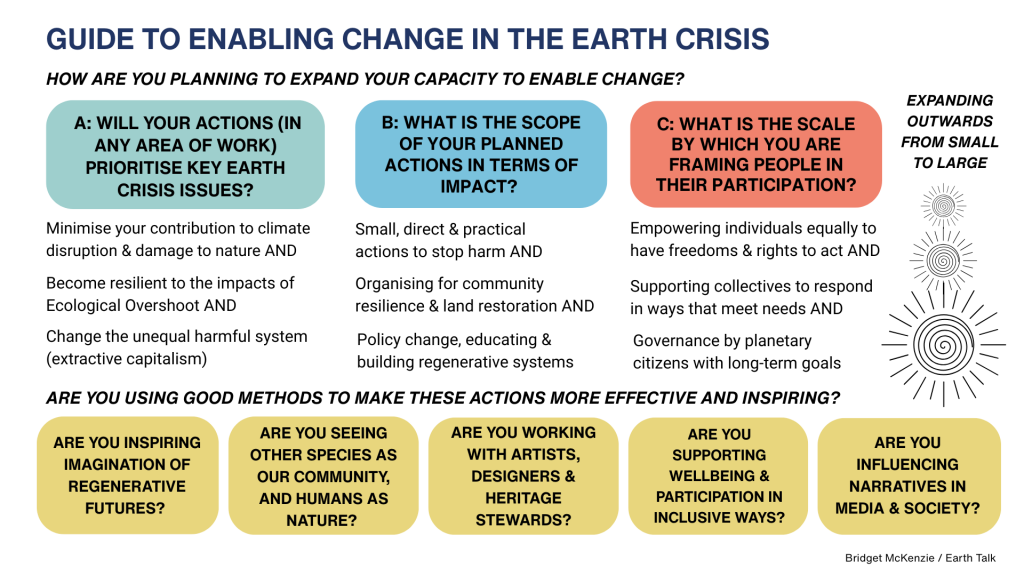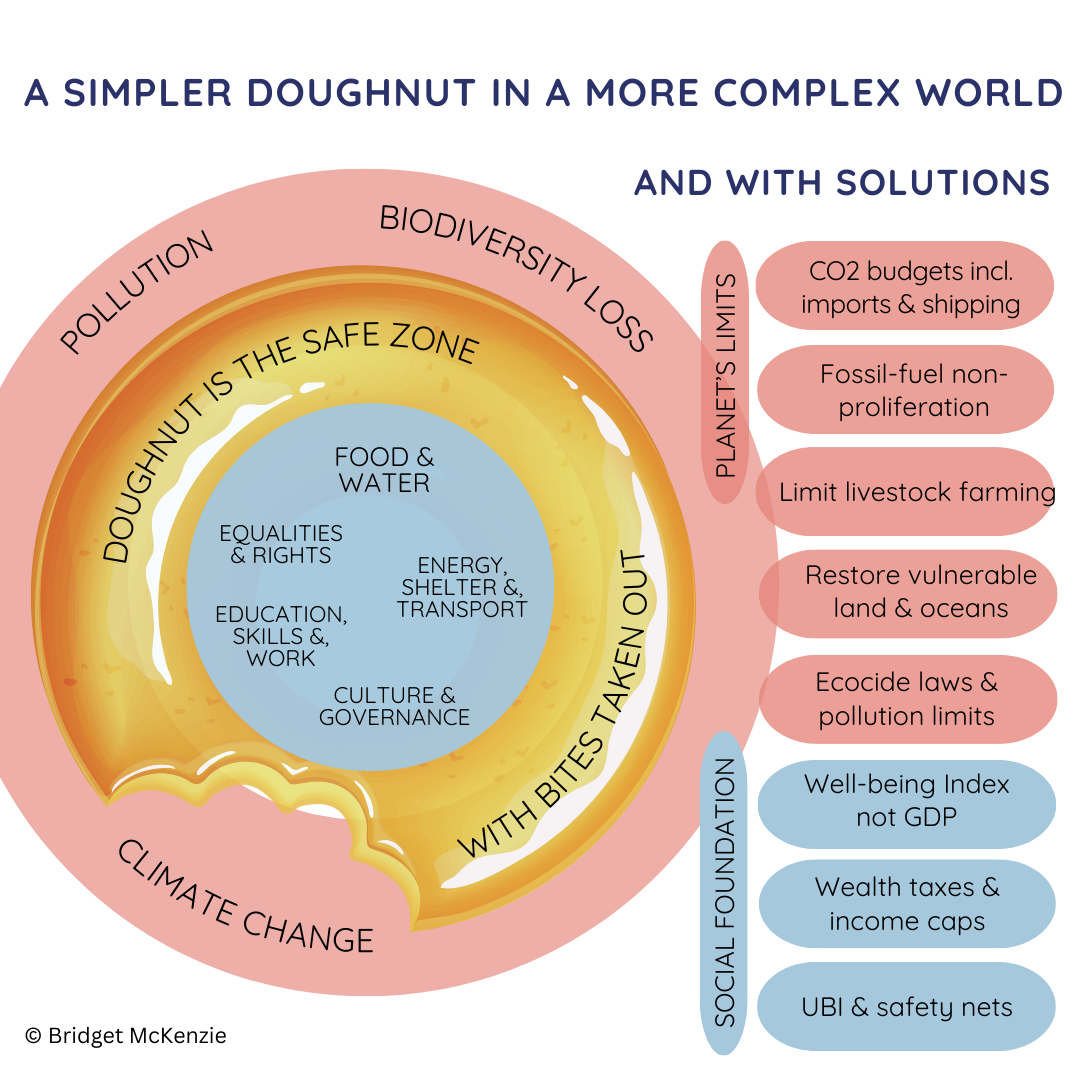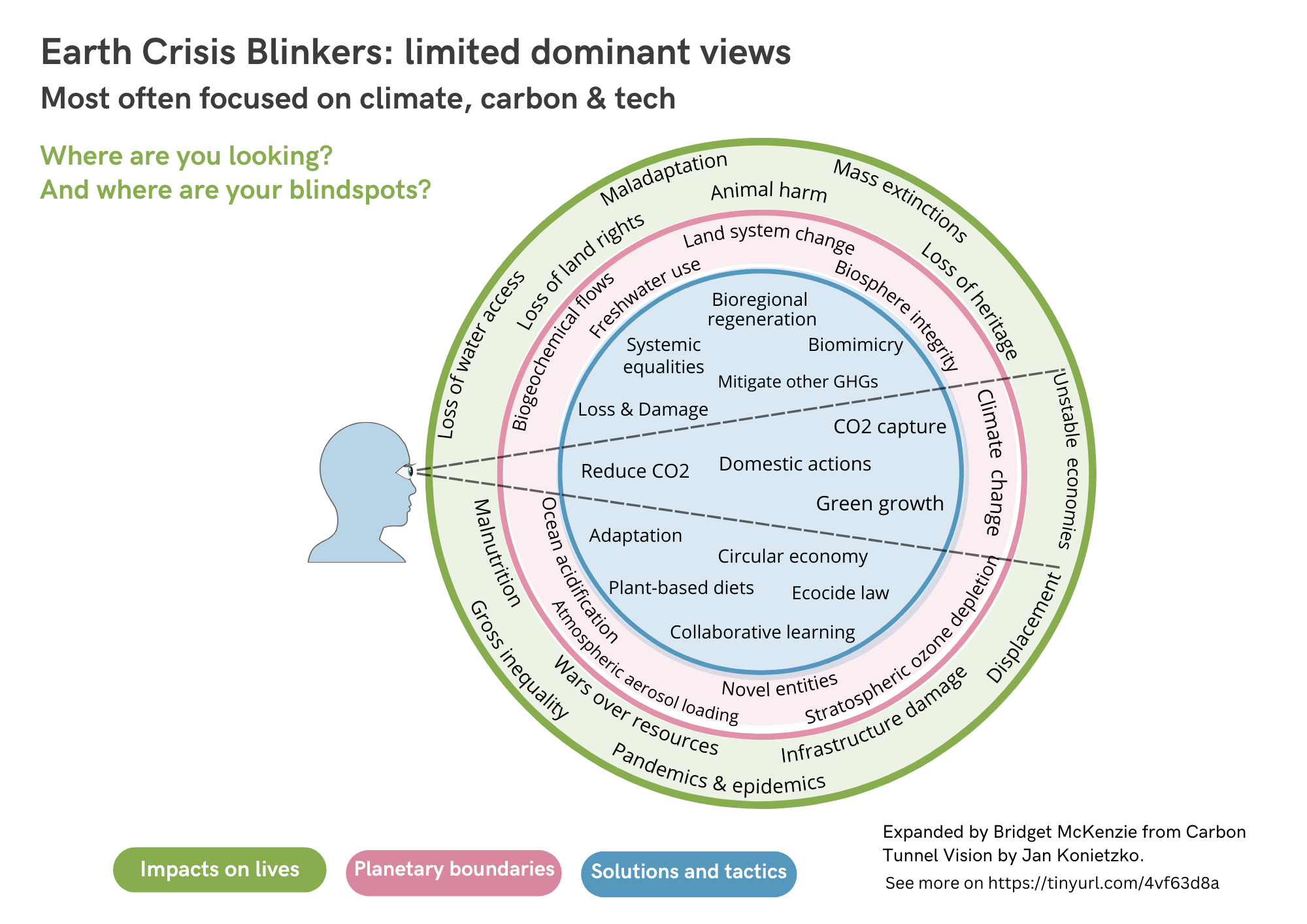INTRODUCTION
There is an emerging body of research and experimental practice on Culture-led public engagement aiming to activate people in response to the Earth Crisis. There is also a range of outputs — such as exhibitions, courses, books, films, art-science and community projects — on environmental issues. These outputs are arising dynamically rather than as a result of any goal-driven strategy, quality standards or significant targeted funding, which relates to a lack of impact evaluation, practitioner training or consensus on quality practice in this field. (This is from my experience in a UK context but I have anecdotal evidence that this is the case more widely.)
Practitioners in Arts, Heritage and Communications who engage the public on the Earth Crisis face challenges such as apathy, disinformation, managerial resistance, limited perceptions of climate engagement, and short-term funding. (See my report for Culture Declares in September 2023 for some voices on these challenges.) These barriers prevent them from fulfilling their potential to develop engagement that might activate the public at scale and over time, or to create transitions in institutions, governments or professional sectors. However, Culture-led practice affords freedoms and opportunities for creative, interdisciplinary and dialogic participation, which could be supported to have greater impacts for generating public understanding, community safety and systemic change.
In 2019, I founded both Climate Museum UK and Culture Declares Emergency, practitioner communities that aim to overcome these barriers and realise these possibilities of engagement for public activation. I have developed a range of conceptual frameworks and practical methods for artists, curators and educators to learn together about environmental issues and collaborate to deliver more impactful and trauma-sensitive programmes in their communities. I convey these through training and resources for both these organisations, and through research for Flow Associates.
This work has provided insights into the support needs of Cultural and public engagement practitioners, and this article is a summary of some of these.
THE REALMS, BARRIERS AND POTENTIAL OF CULTURAL ENGAGEMENT
REALMS OF CULTURAL PRACTICE
Discussions of Culture’s value in the Earth Crisis typically limit their framing of its realms of practice to the storytelling dimension of the Arts and creative industries, with hopes of an emotional punch to change behaviours.
These limited framings undermine Culture’s value and exclude several realms from involvement, such as Intangible Heritage, creative forms of enquiry, or participatory conservation of the environment. They also limit ideas about what Culture can do, being more about behaviour change in domestic and consumer realms, rather than movement-building, ecological restoration, community safety or systemic change.

BARRIERS FACED BY CULTURAL PRACTITIONERS & ORGANISATIONS
- Apathy and backlash in society against eco-action, manipulated by extractive lobbies.
- Lack of equipped readiness and risk awareness of impacts in civic & business sectors, who aren’t setting an example by shifting mission.
- Funding is in silos and short-term, and too small for Culture.
- The UK Cultural defends its value based on pre-crisis framings of Culture.
- The Culture sector is entangled with systems that promote or benefit from harm.
- Duties & standards focus on CO2 footprints in existing activity, not shifts to focus on truth, care & change. Power-holders resist radical approaches.
- Lack of diversity in the Cultural sector e.g. to voice experiences of systemic injustice.
- Precarity for individual artists & low-paid sector workers.
THE POTENTIAL OF CULTURE TOWARDS A REGENERATIVE SYSTEM
The necessary response to the Earth Crisis is to deploy assets and expertise to help efforts, such as:
- To shift the framing of human-nature relations to create conditions that will restore carbon sinks & biodiversity
- To collaborate for community safety in the face of impacts
- To transition to a regenerative industry, agriculture and economy.
There is great potential for the Culture sector to contribute to this by leading:
- Active participatory dialogue with diverse voices
- Place-based engagement with built, natural and intangible heritage to stimulate stewardship
- Imagination of possible alternative futures.
The task includes reframing the purpose of Culture in the context of environmental sustainability. A new framing of Culture’s purpose can place it at the heart of a regenerative and life-honouring shift.

THE EARTH TALK FRAMEWORK FOR CULTURAL ENGAGEMENT WITH THE EARTH CRISIS
Earth Talk is a course, a community of practice and a playbook that offers a rich set of 140+ tools that I developed to help others design effective conversations and creative activities about the Earth Crisis. These activities take people on an Earth Talk journey, an integrated response that includes the elements of:
- Sensing (embodied response, emotions, individual framings),
- Sense-making (investigating science, histories and systems)
- Meaning-making (exploring impacts and relevance for lives)
- Imagining (anticipating, dreaming futures, inventing)
- Activating (collaborating, movement-building, sustaining action).
The community of practice comprises over 50 people, having launched in September 2024. I hope that this community will grow to support the leadership of practice that overcomes barriers and leads a regenerative shift. A couple of core tools are shared below as an example.

TOOLS TO INSPIRE PUBLIC UNDERSTANDING AND ACTION ON THE EARTH CRISIS
These are two of 135+ frameworks, slide-sets, games, workshop templates and other resources, which I have developed for use and adaptation by the Earth Talk & Climate Museum UK communities of practice.
They are examples of how we aim to broaden understanding of climate change, and how we emphasise potential actions available to people.

This model is part of a set to expand people’s awareness of the causes, impacts and potential solutions of the Earth Crisis — or ecological overshoot combined with social shortfall.

This poster is used in a workshop called People Take Action, providing information and inspiration to develop a plan for inner work and outward-facing actions (in eight pathways).
THREE PRINCIPLES OF CULTURAL ENVIRONMENTAL RESPONSIBILITY
There are three dimensions to Environmental Responsibility in the Cultural sector, currently not reflected in typical sustainability policies or plans. These dimensions relate to the three values of Culture Declares Emergency.
FACING RESPONSIBILITY AND TELLING TRUTHS
Be part of a commitment to learn about the Crisis and to reduce harm, engaging with the public as part of this. e.g.
- Reflect on your past responsibilities and potential contributions
- Declare a climate & ecological emergency
- Make pledges to lighten your footprint in terms of CO2, biodiversity, pollution and social injustice
- Hold conversations & design creative experiences to deepen people’s learning and bring people together across divides
- Enable and platform speaking truth to power, from diverse perspectives
- Face uncertainty and possibilities of collapse.
CENTRING CARE AND TRANSFORMATIVE ADAPTATION
Anticipate and prepare for risks and impacts of environmental harms that are inevitable, in inclusive and caring ways. e.g.
- Take care of yourself, colleagues and close communities — applying regenerative principles such as taking rest when needed
- Integrate a crisis-response frame into work that focuses on ‘People Care’ work, e.g. restoring green spaces as part of ‘creative wellbeing’ activities, or supporting resilience in the face of losses and threats of environmental damage
- Include environmental impacts, such as extreme weather and food shortages, in your risk assessments
- After anticipating primary & secondary impacts, take steps to protect buildings, natural sites & cultural artefacts
- Make decisions for the future based on care for others, including future generations and more-than-humans.
CHANGE-MAKING FOR A REGENERATIVE SYSTEM
Be an agent for systemic change for the sake of all affected people, species and future generations. e.g.
- Decolonise: commit to ending practices that are exploitative & unjust, being sensitive to those most affected by ‘trauma culture’ in long-term or structural ways, and with intersectional challenges.
- Help people imagine and build alternatives to this extractive and exploitative culture in their communities and work sectors.
- Promote and commission eco-innovators and regenerative designers, and choose ethical businesses as your suppliers.
- Support programmes for mutual aid, reparations, peace, and restoration of the living world.
- Advocate for and partner with campaigns to change ecocidal & unjust laws, policies and practices.

This model above suggests a dashboard for organisations to increase their adaptation & regeneration work.

This is a guide (above) for enabling change with a nested approach, expanding outwards from small to a larger systemic scale.
AREAS TO SUPPORT CULTURE SECTOR TO PLAY A LEADING ROLE IN
BETTER KNOWN AREAS OF RESPONSE
Public Cultural sector & practitioners could be more involved, valued and funded in these areas, which are often led by commercial, academic or environmental sectors:
- Enhancement of public communication of environmental research through art & science collaborations.
- Experiences of wild green or blue spaces, combined with heritage conservation, adventure play or arts activities.
- Ecocentric architecture & landscape design that creates more regenerative and resilient places.
- Circular-economy enterprises: ecocentric design of products, materials, and systems of waste and production.
- Galvanisation of movements through group identification, graphic messaging, and artistic protest.
- Pro-environmental attitudinal and behavioural shifts are generated through powerful narratives in film, marketing or games.
- Future world-building and democratic understanding through speculative participatory activities and game-play.
LESS WELL KNOWN AREAS OF RESPONSE
Public Cultural sector & practitioners could be supported to lead work in these areas:
- Support inner work integrated with challenging ‘outer work’ or activation.
- Play significant roles in regenerative place-making, not growth-driven ‘regeneration’.
- Help communities protect heritage from harmful development & climate impacts.
- Help people cope with the loss and collapse of thriving livelihoods, places and ecosystems.
- Enable imagination and planning for transformational adaptation.
- Culture-led uses of tech to enrich ‘knowledge commons’ for regenerative outcomes, enable dialogue vs misinformation, defend creativity, and create platforms for conservation.
- Improve physical skills and well-being as environmental impacts affect health.
- Change systems for food, energy or clothing for local sufficiency & global sustainability.
- Inspire imagination of visions of future lifeways and uncertain scenarios of the Earth Crisis.
- Support larger-scale, ambitious, systemic change e.g. champion the Ecocide Law.
- Cultural sites for activation e.g. for assemblies, eco-innovation labs, or artful rewilding of land.
- Decolonise institutions to resist the extractive economy and support community safety.
- Further critical discourse & systemic analysis, providing intellectual leadership and forums.
- Professional development of capacities to respond to and cope with the Earth Crisis.
SELECTED PUBLICATIONS
To read more about my work, here are some published papers and book chapters.
- ‘The Roles of Culture in Response to the Earth Crisis’, self-published, 2024 https://tinyurl.com/yc7fsh96
- ‘How can artful learning help young people in the context of the Earth crisis?’, in ‘Ecologies in Practice’, Palgrave Macmillan, ed Miranda Matthews. Autumn 2025
- ‘Collecting as emergency response to the Earth crisis’, in ‘Ethics of Contemporary Collecting’, Routledge, eds Ellie Miles & Jen Kavanagh, 2024
- ‘The Emergency is an Octopus! Museums activating the public in a planetary emergency’, in ‘Museums and the Climate Crisis’, Routledge, Nick Merriman, 2023
- ‘Case Study 8: Climate Museum UK: Practices in Response to the Traumasphere’, in Toxic Heritage, Routledge, eds E. Kryder-Reid & Sarah May, 2023
- ‘Time to Mend: rewilding museums’, in Museums and Social Issues, Vol 16, 2022
- Museums in an Earth crisis: a conversation on museums, collecting and radical change’, in ‘Reimagining Museums for Climate Action’, UCL, ed. Colin Sterling, 2021



